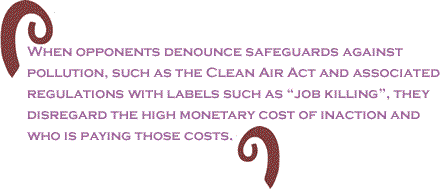As the NAACP State
Conference President for New Jersey I am responsible for
hearing and addressing all types of concerns. In New Jersey
far too many of the complaints I hear relate to deprivation
of what should be a basic human right for all, the right
to breathe clean air.
The racial disparities in air quality lead to disparities
in health and quality of life. An African American making
$50,000 per year is more likely to live in an area cited
for bad air pollution than a white American making $15,000
per year. Arsenic, dioxins, lead, mercury and other pollutants
are spewed daily from various industrial facilities such
as incinerators, power plants, factories, etc., putting
people at risk across the country.� For example, a Clean
Air Taskforce report on power plant pollution found that
emissions from all power plants in the U.S. are responsible
for 30,000 premature deaths, 7,000 asthma-related emergency
room visits, and 18,000 cases of chronic bronchitis each
year.
When opponents denounce safeguards
against pollution, such as the Clean Air Act and associated
regulations with labels such as �job killing�, they disregard
the high monetary cost of inaction and who is paying those
costs. Consumers are already paying for the less-publicized
costs of toxic air quality: mounting health expenses,
lost days of school to care for sick kids, poor performance
for lead exposed kids who have learning challenges, lost
days of work due to illness and trips to take children
to the doctor, etc.
Currently, regulations under the Clean Air Act, such
as the Cross-State Air Pollution Rule and the Mercury
and Air Toxics Rule which aim to reduce pollution
in our air, are under attack by polluters and certain
legislative initiatives in Congress aimed at blocking
the functionality of the Clean Air Act.
These rules are essential for sensible reductions in air
pollution. Supporting these rules would save up to 1200
lives and will prevent heart attacks, hospitalizations,
and ER visits in New Jersey every year.

Robert,
a resident of Jersey City, NJ recently stated that,
�I think that the community members
in the area should be informed and that the media should
really take a look at the kinds of emissions that have
been happening, because nobody wants to raise their children
next to a coal plant like that.� The emissions in this
community are so off the charts and so astronomically
dangerous for human health that I think that once there�s
some light shed on what is really going on with the likes
of things like this coal plant, I hope that will raise
awareness about this, stop these emissions in Jersey,
and really do a lot more to clean up our environment.�
In New Jersey, with more Superfund sites than any other state
in the country, we vigorously oppose any effort to fight
any operations that would increase the already overburdened
pollution that would diminish the air quality.� It is
unfortunate and unjust that so many of the air quality
distracters are placed in areas that are overwhelmingly
populated by African Americans and other poor populations
in New Jersey.� We vigorously oppose any operation that
would erode the quality of clean air in New Jersey, it
is simply unacceptable.� We in the New Jersey State Conference
will work with any and all collaborators who advocate
for cleaner air quality in New Jersey.
Opposing the implementation of the Clean Air Act and
its associated regulations would limit the EPA�s ability
to enforce clean air standards that protect us from significant
amounts of harmful air pollution. Our focus must be on
retaining and strengthening safeguards which protect the
health and well-being of the people living in communities
affected by air pollution, who are over 50% of the US
public and disproportionately communities of color and
low income communities.
Enough is enough. We must maintain existing safeguards, as
well as implement and strengthen standards that protect
our communities. The NAACP New Jersey State Conference
of Branches strongly urges our Senators and Representatives
to support clean air safeguards and oppose proposed measures
in Congress that put their constituents at risk.
Let New Jersey lead the way to cleaner air.

BlackCommentator.com Guest Commentator James E. Harris is President of the NAACP New Jersey
State Conference.� Click here
to contact Mr. Harris.

